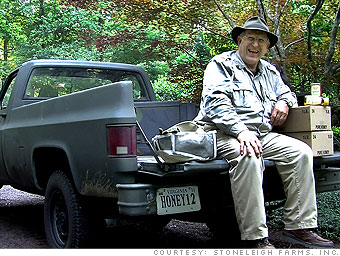Search News

One of the most important things Phillip Ramsey has learned about sustainable agriculture is that you have to give "the girls" a little respect.
"The girls" are thousands of honeybees that comprise the colonies of Ramsey's seven-year-old operation in rural Virginia. They "do all the work," said Ramsey. "We just try to help them get what they need."
What they need is biological diversity and plenty of different crops to pollinate where their hives are located. Unlike most pollinating bees that are trucked all over the country like migrant workers following the crops, Ramsey never moves his bees more than a mile. Even then, he only moves the trucks they are on, not the hives themselves.
"Bees are geo-centric and can fly five miles away, but return with pinpoint precision as good as any GPS," explains Ramsey. Excessive movement stresses them, making their immune systems susceptible to infections, viruses, mites and even colony collapse.
Buying military surplus equipment, a trick he heard through "the farmer grapevine" solved the problem. Ramsey's bee colonies are mounted on the flatbeds of M105 military trailers and pulled by 6 x 6 trucks Ramsey bought at auction. He paid less than $4,000 for the trucks, which he runs on vegetable oil collected from area restaurants. Such surplus has saved him well over several hundred, if not thousands of dollars, he said.
In a good year, Ramsey's bees can produce 35,000 pounds of honey, all of which is sold to grocery chains and boutique retailers, but such a yield is always based on the emotional state of the girls. The company made $100,000 in revenue last year.
"You can listen to a hive and if you hear only one musical note, the bees are happy. If you hear discordant notes like 8th graders tuning their violins, you've got problems."
